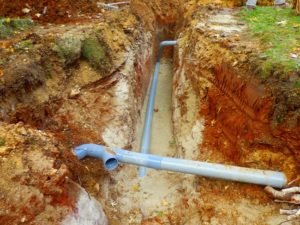Polybutylene Pipe Replacement: the Problem with “Big Blue”
 From the late 1970s to the mid-1990s, one of the preferred plumbing materials for new homes was polybutylene pipe. Also known as “big blue,” due to the blue color of some pipes, polybutylene was a popular choice for plumbing because it was inexpensive and durable. Over time, homeowners, plumbing experts, and scientists discovered that polybutylene pipe was not as durable as they had once believed. Read on to learn more about how to determine if you have polybutylene pipes, the problems with “big blue,” and whether or not you should consider polybutylene pipe replacement.
From the late 1970s to the mid-1990s, one of the preferred plumbing materials for new homes was polybutylene pipe. Also known as “big blue,” due to the blue color of some pipes, polybutylene was a popular choice for plumbing because it was inexpensive and durable. Over time, homeowners, plumbing experts, and scientists discovered that polybutylene pipe was not as durable as they had once believed. Read on to learn more about how to determine if you have polybutylene pipes, the problems with “big blue,” and whether or not you should consider polybutylene pipe replacement.
-
Does Your Home Have Polybutylene Pipes?
If your home was built or renovated any time during the 1970s through the 1990s, your home may have polybutylene pipes. Polybutylene pipes can be the trademark blue color, but they can also be black or gray. If your water main pipe is blue, black, or gray plastic, you may have polybutylene. These pipes were often paired with copper connectors. Look for the letters “PB” or “QEST” printed on the pipes. If you see these, you should contact your local plumbing professional to see about polybutylene pipe replacement. If you do not see these signs of polybutylene in your home, there still may be segments of hidden plumbing that use polybutylene.
-
The Problem with “Big Blue”
You are probably wondering what the problem is with polybutylene plumbing. While it is nothing as nefarious as leaching toxic chemicals into the water supply, polybutylene can cause a lot of damage and headache for homeowners. When exposed to chlorine and chloramines that are commonly found in the public water supply, polybutylene pipes can break down. This is especially true in areas like corners and joints where the plastic is already under stress. This breakdown leads to leaks and water damage, which often happens suddenly.
-
Polybutylene Pipe Replacement
You have big blue pipes in your home, so now what? Essentially, your polybutylene pipes will be replaced with pipes made from CPVC or another material. The process will depend on the extent of the presence of big blue in your plumbing. Once you have confirmed that you have polybutylene in your home’s plumbing, talk with your trusted plumbing contractor about polybutylene pipe replacement.
Experience the Metcalf Plumbing Difference
Metcalf Plumbing is a customer-focused plumbing contractor serving residential and commercial clients throughout the Catonsville, Ellicott City and surrounding areas. From water heater installation, sump pump installation and repair to water and sewer line replacement, Metcalf Plumbing is a trusted resource to call on when you need help with your plumbing services. We are not commission-based and we provide honest, upfront costs with a thorough inspection of your system and suggested next steps. Our trained and courteous technicians are standing by to provide quality comfort at competitive prices. You can call us at 410-242-311 and don’t forget to follow us on Facebook and Twitter!
